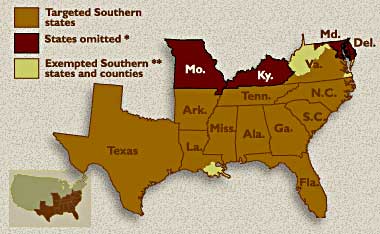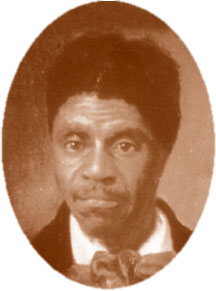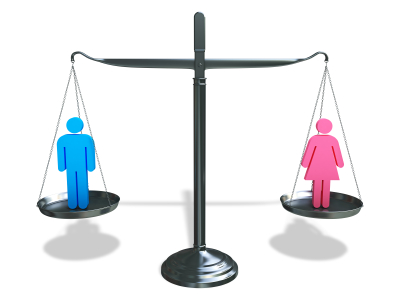 Lincoln's step forward was a very big step forward. In 1863, on the first day of January, Lincoln commences the Emancipation proclamation. This proclamation sets all slaves free forever and to stay away from violence unless needed to defend. Lincoln issues this act to all the states with the Union and to all the slaves that support the Union who are in the South. Lincoln issues this address, but not to the rebelled states including: Arkansas, Texas, parts of Louisiana and Virginia, Mississippi, Alabama, Florida,
Georgia, South Carolina, and North Carolina.
Lincoln's step forward was a very big step forward. In 1863, on the first day of January, Lincoln commences the Emancipation proclamation. This proclamation sets all slaves free forever and to stay away from violence unless needed to defend. Lincoln issues this act to all the states with the Union and to all the slaves that support the Union who are in the South. Lincoln issues this address, but not to the rebelled states including: Arkansas, Texas, parts of Louisiana and Virginia, Mississippi, Alabama, Florida,
Georgia, South Carolina, and North Carolina.
Monday, November 26, 2012
LAD #20: Emancipation Proclamation
 Lincoln's step forward was a very big step forward. In 1863, on the first day of January, Lincoln commences the Emancipation proclamation. This proclamation sets all slaves free forever and to stay away from violence unless needed to defend. Lincoln issues this act to all the states with the Union and to all the slaves that support the Union who are in the South. Lincoln issues this address, but not to the rebelled states including: Arkansas, Texas, parts of Louisiana and Virginia, Mississippi, Alabama, Florida,
Georgia, South Carolina, and North Carolina.
Lincoln's step forward was a very big step forward. In 1863, on the first day of January, Lincoln commences the Emancipation proclamation. This proclamation sets all slaves free forever and to stay away from violence unless needed to defend. Lincoln issues this act to all the states with the Union and to all the slaves that support the Union who are in the South. Lincoln issues this address, but not to the rebelled states including: Arkansas, Texas, parts of Louisiana and Virginia, Mississippi, Alabama, Florida,
Georgia, South Carolina, and North Carolina.
LAD #19: Lincoln's 2nd Inaugural Address
 In Lincoln's Second Inaugural Address, Lincoln says that a detailed statement is more proper now than an address.Lincoln states that he has no idea when the war will end, but hopes it will pass by fast. His first address was directed towards saving the Union and attempting to avoid war but "one of them would make war rather than let the nation survive, and the
other would accept war rather than let it perish, and the war came." Lincoln blames the war on the slavery to have separated the country. Both the South and North are similar in many ways because they are all the same people under the same God. Lincoln also states that God's plan will finish what was started. Lincoln will forgive his secessionists as they repair the Union and the destruction.
In Lincoln's Second Inaugural Address, Lincoln says that a detailed statement is more proper now than an address.Lincoln states that he has no idea when the war will end, but hopes it will pass by fast. His first address was directed towards saving the Union and attempting to avoid war but "one of them would make war rather than let the nation survive, and the
other would accept war rather than let it perish, and the war came." Lincoln blames the war on the slavery to have separated the country. Both the South and North are similar in many ways because they are all the same people under the same God. Lincoln also states that God's plan will finish what was started. Lincoln will forgive his secessionists as they repair the Union and the destruction.
Wednesday, November 21, 2012
LAD #18: Dred Scott Decision
 Roger B. Taney, Chief Justice, had one of the most important cases in history to review. The Scott v. Sanford case played an important role on American society and would change the lives of slaves. Taney ruled in favor of Sanford because Scott was a slave and his parents were imported into the country, so therefore he was not a citizen. Scott was unable to sue either because he did not have the rights as a non-citizen. Since the Missouri Compromise did not specify that people had the right to own property, slaves, so Taney ruled the Missouri Compromise unconstitutional. Scott was unable to gain his freedom as the court case was held in Missouri, a slave state. Scott's hopes of staying in Illinois would not occur as he was sentenced a slave and not free.
Roger B. Taney, Chief Justice, had one of the most important cases in history to review. The Scott v. Sanford case played an important role on American society and would change the lives of slaves. Taney ruled in favor of Sanford because Scott was a slave and his parents were imported into the country, so therefore he was not a citizen. Scott was unable to sue either because he did not have the rights as a non-citizen. Since the Missouri Compromise did not specify that people had the right to own property, slaves, so Taney ruled the Missouri Compromise unconstitutional. Scott was unable to gain his freedom as the court case was held in Missouri, a slave state. Scott's hopes of staying in Illinois would not occur as he was sentenced a slave and not free.
Monday, November 19, 2012
LAD #17: Ain't I a Woman?
Sojourner Truth at the Women's Convention in Akron, Ohio stating her beliefs on women's rights. She believes it is unfair because she comes from unfair treatment. During this time period, blacks and women were not treated fairly and Truth talks about how nobody has helped her into carriages or over mud puddles. Instead she works on plantations and sees her children separate being sold to slavery. Truth believes that men have no right to treat women poorly because God came from a woman which means they should be capable of treating them fairly.
LAD #16: 5th of July Speech
Frederick Douglas begins his speech by asking the audience why is he is there in Rochester. He claims that the Fourth of July is not celebratory day for all. The blacks are unable to celebrate this day because it is only for whites. It is a joke to blacks as the Fourth of July stresses the importance of independence and freedom, yet their own population does not treat them with freedom. "What, to the American slave, is your Fourth of July?" There basically is no point for the blacks to celebrate for the superior races' freedom when they are not allowed to have their own. Douglas ends his speech with saying that he hopes slavery will come to an end someday because it goes against the countries' beliefs within the Constitution. 

Saturday, November 17, 2012
LAD 15 Lincoln's Gettysburg Address
 One of the most famous sayings "Fourscore and seven years ago..." brings one of Lincoln's most important moments in his presidency. Lincoln states that the men who are in battle now are not nearly as praised as the ones that sacrificed their lives and died during battle. The men who died risked their lives to determine the correct way of America's position. Also, the men who battled will not die in vain because they are doing it for the "freedom, and that government of the people, by the people, for the people shall not perish from the earth."
One of the most famous sayings "Fourscore and seven years ago..." brings one of Lincoln's most important moments in his presidency. Lincoln states that the men who are in battle now are not nearly as praised as the ones that sacrificed their lives and died during battle. The men who died risked their lives to determine the correct way of America's position. Also, the men who battled will not die in vain because they are doing it for the "freedom, and that government of the people, by the people, for the people shall not perish from the earth."
LAD #14 Lincoln's First Inaugural Address
 In Lincoln's First Inaugural Address, he begins his first major topic of slavery. Lincoln believes that he has no right to interfere with it and that the states have the right to to do whatever they want to do. The states have the right and other states cannot interfere according to the Constitution. Also, the fugitive slave law should be enforced to all the states because it is stated in the Constitution. Lincoln goes on to talk about the disunity of the nation. "But if destruction of the Union by one or by a part only of the States
be lawfully possible, the Union is less perfect than before the Constitution, having lost the vital element of perpetuity." Lincoln's intentions are in the right direction because he wants to execute the current laws and not have states avoid them. Lincoln comes in to a tough time period because the sectionalism is high, but Lincoln intends to not use force to persuade actions. It is truly up to the people to decide whether war comes or not he promises to "preserve, protect, and defend it." Lincoln's main objection is to preserve unity within the country and keep everyone together, "We are not enemies, but friends. We must not be enemies"
In Lincoln's First Inaugural Address, he begins his first major topic of slavery. Lincoln believes that he has no right to interfere with it and that the states have the right to to do whatever they want to do. The states have the right and other states cannot interfere according to the Constitution. Also, the fugitive slave law should be enforced to all the states because it is stated in the Constitution. Lincoln goes on to talk about the disunity of the nation. "But if destruction of the Union by one or by a part only of the States
be lawfully possible, the Union is less perfect than before the Constitution, having lost the vital element of perpetuity." Lincoln's intentions are in the right direction because he wants to execute the current laws and not have states avoid them. Lincoln comes in to a tough time period because the sectionalism is high, but Lincoln intends to not use force to persuade actions. It is truly up to the people to decide whether war comes or not he promises to "preserve, protect, and defend it." Lincoln's main objection is to preserve unity within the country and keep everyone together, "We are not enemies, but friends. We must not be enemies"
Tuesday, November 13, 2012
LAD #13 John Calhoun's Speech
 In the mind of John C. Calhoun, slavery is the biggest reason for the sectionalism tensions. There are a great gap in between the eyes of slavery in the viewpoint of the North and South. Calhoun would like to preserve the union and states slavery is separating it. Calhoun addresses other topics of sectionalism such as the tariffs and acts that supported certain areas of the country. The South is faced with many wishes to secede from the tensions that are rising between the North and South. Calhoun proposes that peace can be accomplished through making the South more equal with new laws and ways to accept slavery and the South to claim land. Calhoun adds that the South would like to add California to the South or it would be seen as disliking the South. Calhoun was a strong man to propose the Southern feelings and was fit for this job.
In the mind of John C. Calhoun, slavery is the biggest reason for the sectionalism tensions. There are a great gap in between the eyes of slavery in the viewpoint of the North and South. Calhoun would like to preserve the union and states slavery is separating it. Calhoun addresses other topics of sectionalism such as the tariffs and acts that supported certain areas of the country. The South is faced with many wishes to secede from the tensions that are rising between the North and South. Calhoun proposes that peace can be accomplished through making the South more equal with new laws and ways to accept slavery and the South to claim land. Calhoun adds that the South would like to add California to the South or it would be seen as disliking the South. Calhoun was a strong man to propose the Southern feelings and was fit for this job.
LAD #12 Polk's War Message
 President Polk begins his speech to state that his efforts to establish good relationships with Mexico were rejected. The Mexicans went off to attack some nearby settlements in America. John Slidell was the cause of this action because peace was accepted with America until he arrived to Mexico. Under General Herrera, the Mexicans denied Sidell violently and was rejected. Under General Paredas, Sidell was again rejected at any chance of resolving situations. Sidell came home with no success which fired Polk up to send troops into Mexico which were at first for security. In the end, Polk cared about his countries freedom only and wanted to fight back.
President Polk begins his speech to state that his efforts to establish good relationships with Mexico were rejected. The Mexicans went off to attack some nearby settlements in America. John Slidell was the cause of this action because peace was accepted with America until he arrived to Mexico. Under General Herrera, the Mexicans denied Sidell violently and was rejected. Under General Paredas, Sidell was again rejected at any chance of resolving situations. Sidell came home with no success which fired Polk up to send troops into Mexico which were at first for security. In the end, Polk cared about his countries freedom only and wanted to fight back.
Monday, November 12, 2012
LAD #11 - Seneca Falls Declaration
The Seneca Falls Declaration was risen up from the people that wanted to make a change. They stood out from the rest because they could not take what they were living with and needed to make the the best of their occupation. Elizabeth Cady Stanton, Frances Wright, Ernestine Rose and many others participated in sharing their piece of mind to believe that they are equal. "We hold these truths to be self-evident: that all men and women are
created equal". The women state how poorly that they have been mistreated and abused by men including how men take women as property and can take their money and how the man has made her morally irresponsible. Also, the women state their thoughts on solutions that the creator intended for all his people to be equal and that it is the women's responsibilities to speak and encourage teaching. Women played a key role in society and the Seneca Falls Declaration was a step forward in gaining their freedom.

Subscribe to:
Comments (Atom)
